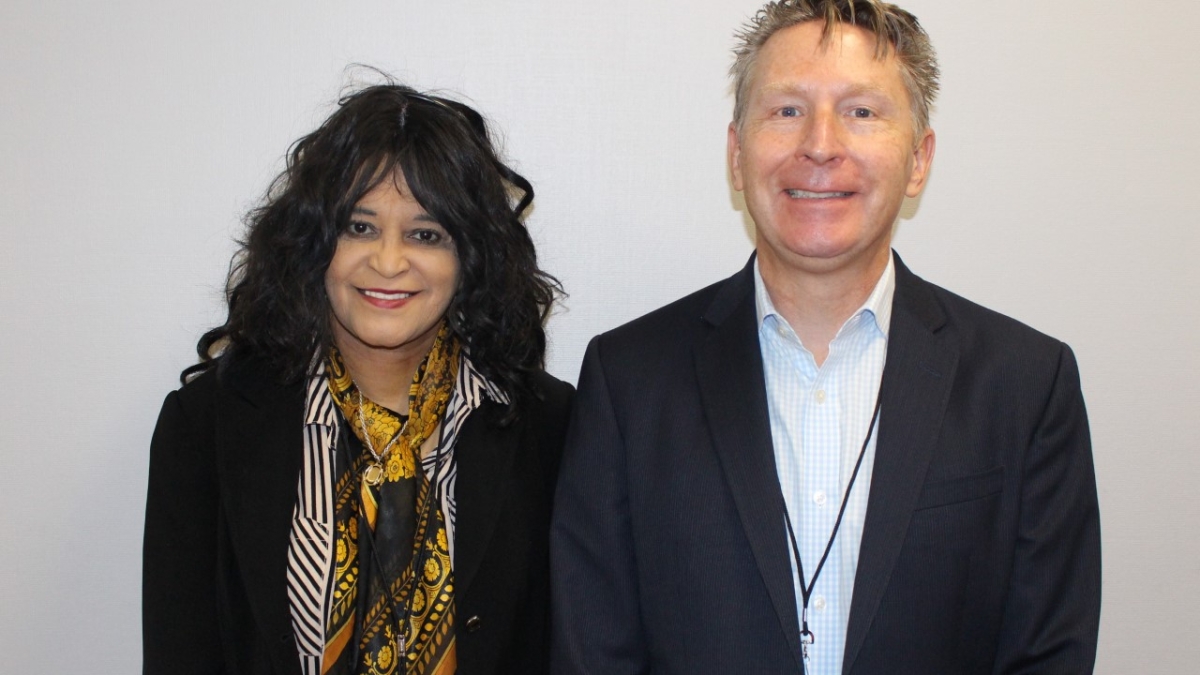ASU hosts 38th conference of the Sudan Studies Association of North America

ASU Associate Professor Souad T. Ali and humanities Dean Jeffrey Cohen.
Arizona State University recently hosted the 38th annual conference for the Sudan Studies Association of North America.
The conference, held at the Tempe campus June 7-9, was organized and facilitated by the association's president, Souad T. Ali, who is the faculty head of Middle Eastern and classics studies, coordinator of Arabic and associate professor of Middle Eastern studies, Arabic literature and Islamic studies in ASU's School of International Letters and Cultures. Co-organizer of the conference was Abdullahi A. Gallab, associate professor in the School of Social Transformation’s African and African American studies, home of the Sudan Studies Association.
The focus of this year’s conference was twofold: Participants addressed the themes of relations and economic development between Sudan and South Sudan as well as the Sudans and their diasporas. The conference opened with welcoming remarks by Jeffrey Cohen, dean of humanities in The College of Liberal Arts and Sciences, who highlighted the importance of the humanities and The College — including the different programs it offers and the several conferences it hosts — as well as Ali’s role in bringing the conference to ASU. The assocation's 37th conference was held at Northwestern University in Illinois last year.
This year's conference featured two keynote speeches. Pamela DeLargy, professor of practice in ASU's School of Politics and Global Studies, led and facilitated “Ana Sudani (I am Sudanese): Will the Sudanese Youth be Able to Resolve the Sudan’s Age Afro-Arab Identity Issues and Create a New Nation?” Suliman Baldo, U.N. independent expert on human rights and senior policy adviser for the Enough Project, also led a keynote address on “The Economic Underpinnings of Sudan’s Militia State.”
Given the current humanitarian crisis in the Sudans, this year’s conference was especially relevant. Conference attendees participated in sessions that explored some of the root causes and possible solutions for conflict in the Sudans. Topics covered in these sessions included sustainable development, gender, migration, health, economics, politics and history.
An art gallery display by Khalid Kodi, adjunct professor at Boston College, addressed themes of Sudanese identity. A book display featured the diversity of scholarship in Sudanese studies by both Sudanese, American, European and other Sudanist authors.
The conference also looked to solutions for the future of the Sudans. One of the roundtable discussions on the final day of the conference — organized by Lako Tongun, Sudan Studies Association vice president, and led by Gallab — addressed this topic in a panel titled, “The Ties That Bind, Current Crises, and the Futures of the Sudans.”
The Sudan Studies Association is the U.S.-based professional association for scholars of Sudan and South Sudan, with members from the United States, Sudan, South Sudan, Germany, Britain, Canada and several other countries. The association was founded in 1981 in the U.S. to pursue knowledge about all aspects of life in Sudan (and now South Sudan) and to "foster closer ties among scholars in the Sudan, North America, Europe, the Middle East, and elsewhere," said Ali, who is also the founding chair of the ASU Council for Arabic and Islamic Studies.
The association seeks to promote research about the dynamics that shape Sudan and South Sudan and their relationships with neighboring countries. Conferences are held annually in North America. In addition, international conferences have in recent years been convened in Durham, England; Bergen, Norway; Peoria, South Africa; and Bonn, Germany, among others.
“We extend our thanks and appreciation to President (Michael) Crow, Provost (Mark) Searle, Deans Patrick Kenney and Jeffry Cohen, and Director Nina Berman for appreciated support that made this unique conference possible,” Ali said.
The first time the Sudan Studies Association came to ASU was in 2012, led by Gallab, and resulted in an edited volume, "The Road to the Two Sudans," co-edited by Ali and other scholars.
Written by Samantha Hill, sahill9@asu.edu.
More Law, journalism and politics
Can elections results be counted quickly yet reliably?
Election results that are released as quickly as the public demands but are reliable enough to earn wide acceptance may not…
Spring break trip to Hawaiʻi provides insight into Indigenous law
A group of Arizona State University law students spent a week in Hawaiʻi for spring break. And while they did take in some of the…

LA journalists and officials gather to connect and salute fire coverage
Recognition of Los Angeles-area media coverage of the region’s January wildfires was the primary message as hundreds gathered at…

